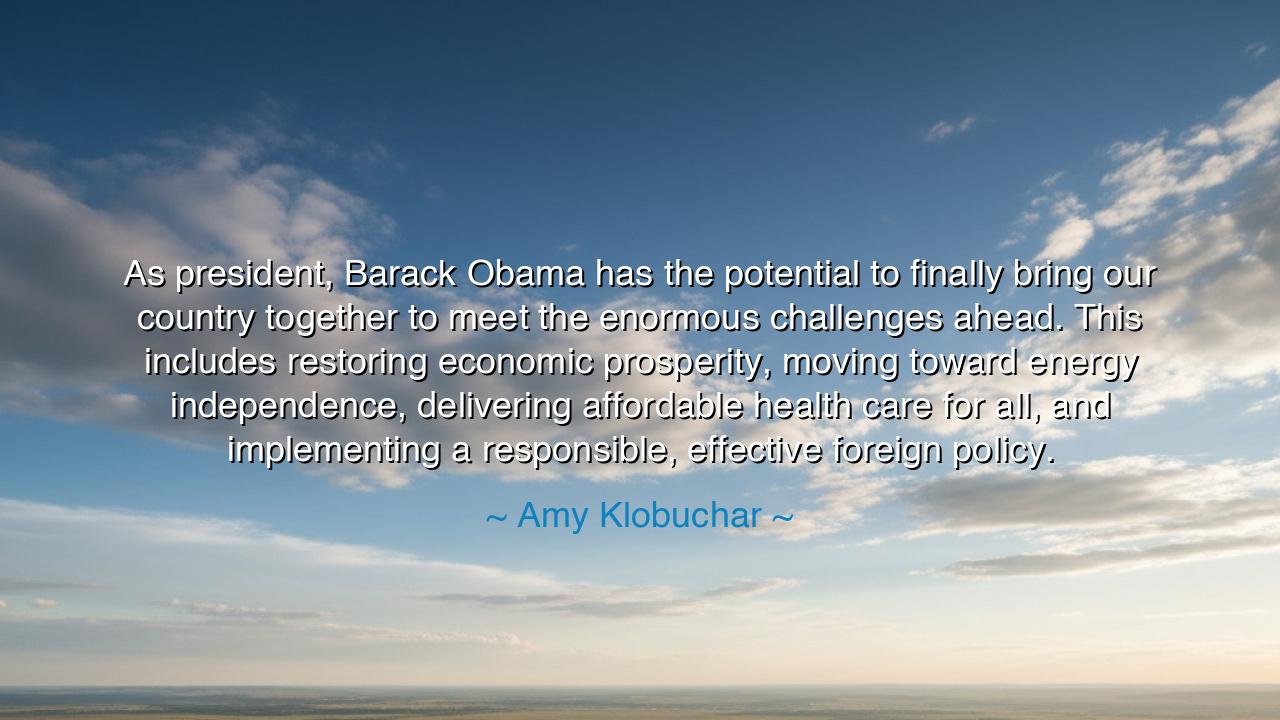
As president, Barack Obama has the potential to finally bring our
As president, Barack Obama has the potential to finally bring our country together to meet the enormous challenges ahead. This includes restoring economic prosperity, moving toward energy independence, delivering affordable health care for all, and implementing a responsible, effective foreign policy.






“As president, Barack Obama has the potential to finally bring our country together to meet the enormous challenges ahead. This includes restoring economic prosperity, moving toward energy independence, delivering affordable health care for all, and implementing a responsible, effective foreign policy.” Thus spoke Amy Klobuchar, the senator and daughter of the American heartland, in an age of deep uncertainty and division. Her words, though framed in the politics of her time, carry the timeless hope of all generations — that in moments of darkness, there might arise a leader capable of uniting the people and guiding them through turmoil toward renewal. Her declaration is not merely praise for one man, but a testament to the eternal longing of humankind for unity, wisdom, and visionary leadership.
To understand the meaning of her words, we must return to the dawn of Barack Obama’s presidency — a time when the world stood on trembling ground. The year was 2009, and the United States faced one of the gravest crises since the Great Depression. The economy had faltered, millions had lost their homes, and faith in the nation’s institutions had grown frail. Abroad, wars lingered in Iraq and Afghanistan; at home, the wounds of partisanship deepened. In this moment of despair, Obama rose with a message that echoed across every divide: that America’s strength lay not in its wealth or weapons, but in its capacity to come together. Klobuchar’s words, therefore, capture not only political optimism but spiritual truth — that a nation’s healing begins with unity of purpose.
In her quote, Klobuchar speaks of four pillars upon which that renewal might stand: economic prosperity, energy independence, health care for all, and responsible foreign policy. These were not random ambitions, but reflections of the challenges that had long haunted the Republic. The pursuit of prosperity, for instance, had become hollow when divorced from fairness; thus, she calls for an economy that lifts not only the fortunate but the forgotten. The cry for energy independence speaks to both the planet and the spirit — a desire to break free from dependence on forces that drain both wealth and will. And in her invocation of affordable health care, she touches upon the oldest promise of civilization itself: that a society is only as strong as its compassion for the weak.
When she speaks of responsible foreign policy, Klobuchar invokes the wisdom of restraint — the idea, as old as empire, that greatness is not measured by domination but by justice. The ancients understood this well. When Marcus Aurelius, emperor of Rome, wrote in his Meditations that the truest victory is the mastery of one’s own impulses, he was speaking the same truth: that power untempered by principle leads to ruin. So too does Klobuchar’s hope reflect this lesson — that America’s strength would not be restored by the sword, but by the steady hand of wisdom and the moral courage to act rightly in the sight of history.
The origin of this quote lies in a moment of rare political alignment — when leaders, citizens, and nations alike looked upon Obama not merely as a politician, but as a symbol of transformation. His election, the first of an African American to the highest office, was seen as a testament to progress and possibility. To many, it was the embodiment of hope — that the divisions of race, class, and creed could finally give way to shared destiny. Klobuchar’s statement reflects this collective yearning, this belief that one leader might bridge what decades had torn apart. And though history would later reveal the depth of the obstacles he faced, her words remind us of the sacred power of potential — the faith that even in cynicism, the human spirit can still dream of unity.
Consider also the ancient tale of Pericles, leader of Athens during its golden age. Like Obama, he rose in a time of rebuilding, guiding a city bruised by war into an era of democracy and art. Yet Pericles understood, as Klobuchar’s words imply, that unity cannot be commanded — it must be inspired. He once said, “The secret of happiness is freedom, and the secret of freedom is courage.” Klobuchar’s belief in Obama was born of that same faith: that courage, compassion, and clear purpose could awaken the sleeping strength of a divided nation.
And so, my child of this restless world, take this lesson to heart. Klobuchar’s words are not merely about politics; they are a reflection of an ancient truth: no leader can heal a nation that refuses to heal itself. Each generation must rise to meet its own challenges with courage and faith. Do not wait for one figure to bring unity — become part of it. Work toward your own independence — not only of energy or wealth, but of thought, of fear, of bitterness. Practice compassion in your circle, justice in your actions, and reason in your speech, for these are the foundations upon which nations are rebuilt.
For as Amy Klobuchar reminds us, leadership is not only found in palaces or parliaments — it lives in the collective will of a people to rise above their divisions and strive together for something greater. The true independence of a nation, like that of the soul, is born not in isolation but in harmony — when hearts and minds move together in purpose, and when wisdom guides power with the steady hand of truth.






AAdministratorAdministrator
Welcome, honored guests. Please leave a comment, we will respond soon